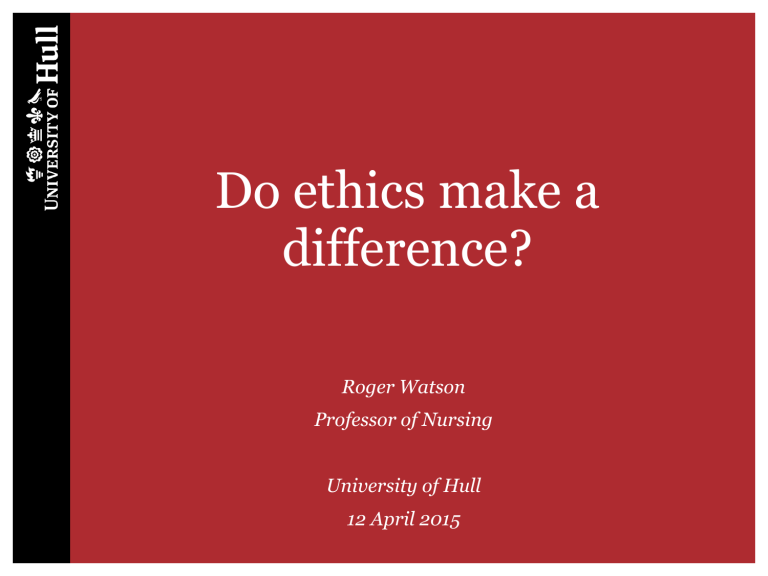Do ethics make a difference to health care

Do ethics make a difference?
Roger Watson
Professor of Nursing
University of Hull
12 April 2015
What are ethics?
• Ethics are what you do when nobody is looking
Without ethics
• Your guess is as good as mine
• Expediency rules
• People become objects
• Dishonesty becomes common practice
• Extremism takes over
Where do ethics apply?
• Patient care decisions
• Research involving patients
• Research not involving patients
• Reporting research results
Patient care
• Issues:
– Information giving
– Information sharing
– End-of-life decisions
– Prioritisation of resources
Information giving
• What is wrong with me?
• Am I dying?
• Will I get better?
• How long will I live?
Information sharing
• Should a family know a diagnosis before the patient?
• Does a family member or any significant other have a right to know what it wrong with a patient?
• Should patient information be available for research?
End-of-life decisions
• Should life be extended at any cost?
– To the individual?
– To society?
• Is euthanasia acceptable?
• Who knows best?
Prioritisation of resources
• To whom should scarce medical resources be available?
• Whose life is more important: e.g mother or unborn child?
• Should we invest in prevention or cure?
Ethical requirements in research
• Necessary to ensure that harm to participants is minimised
Ethical frameworks
• Deontological
– Based on rules
• Utilitarian
– The end justifies the means
• Personal
– What you think is right
Ethical framework
• A commonly used framework is that of Beauchamp
& Childress:
– respect for autonomy
– non-maleficence
– beneficence
– justice
Respect for autonomy:
• respecting the decision-making capacities of autonomous persons
• enabling individuals to make reasoned informed choices
.
Beneficence
• this considers the balancing of benefits of treatment against the risks and costs
• the healthcare professional should act in a way that benefits the patient
Non maleficence
• avoiding the causation of harm
• the healthcare professional should not harm the patient.
All treatment involves some harm, even if minimal, but the harm should not be disproportionate to the benefits of treatment.
Justice
• distributing benefits, risks and costs fairly
• the notion that patients in similar positions should be treated in a similar manner.
Ethics specific to research
Respect for autonomy
• Informed consent (1)
– Information
• Full information about what participation means must be provided to the participants
• Information must be:
– For a wide reading ability
– Written in non-technical language
– Explain risks and benefits
Ethics specific to research
Respect for autonomy
• Informed consent (2)
– Consent
• People must give their consent prior to participation
• Consent should be signed
• People should be able to withdraw without prejudice to their treatment
• Special considerations
– Incentives
– People unable to give consent
Ethics specific to research
Beneficence
• The outcome – by intention – of the research should have the potential to do good (general)
Ethics specific to research
Non maleficence
• The outcome – by intention – of the research should have the potential to do no harm (general)
• If the research is harming the participant then there must be a mechanism to detect and withdraw the participant
(specific)
Ethics specific to research
Justice
• Research should not only be designed for the ‘normal’ demographics in terms of:
– Age
– Ability
– Social status
– Ethnicity
Governance of research
Mechanisms must be in place to:
• Training and certification of those involved in research
• Monitor compliance with ethical requirements
• Check record keeping of:
– Consent
– Recruitment
– Reporting of adverse events consequences
– Follow up of participants
Reporting research
Avoiding fraud:
• Fabrication:
– Invention of data or cases
• Falsification:
– Wilful distortion of data
• Ignoring outliers?
• Not admitting that some data are missing.
• Post hoc analyses that are not admitted?
• Not including data on side effects in a clinical trial
Ethical Issues in Publication
1. Duplicate Publication
2. Authorship and Order
3. Scientific Misconduct (including plagiarism)
4. Conflict of interest
Duplicators and plagiarisers
•62,312 Medline citations (sample)
•0.04% with no shared author but content highly similar = plagiarism
•1.35% with shared authors and highly similar content = duplication
•Therefore, possibly 3500 plagiarised and 117,500 duplicate papers
(Mounir Errami et al 2008)
Duplicate Publication
• Not republishing the same findings
• Not submitting the same manuscript to two or more journals at once
• Not dividing one research project into many little papers (“salami slicing”)
Authorship
• Who can be an author?
• Authorship order
• Issues and problems with authorship
Authorship
• International Committee of Medical Journal Editors
(ICMJE) at http://www.icmje.org/ states authorship is based on:
• 1) substantial contributions to the conception and design of a paper, or acquisition of data or analysis and interpretation of data, and,
• 2) drafting the article or revising it critically for important intellectual content and final approval of the version to be published.
Plagiarism
• Plagiarism ranges from the unreferenced use of others’ published and unpublished ideas, including research grant applications to submission under “new” authorship of a complete paper, sometimes in a different language.
• It may occur at any stage of planning, research, writing, or publication: it applies to print and electronic versions.
What is Conflict of Interest?
• Conflict of interest
– a set of conditions in which professional judgement concerning a primary interest
(such as the validity of a research study) tends to be unduly influenced by a secondary interest (such as financial gain).
– ....or may give that impression
• Founded in 1997 as a response to growing anxiety about the integrity of authors submitting studies to medical journals.
• Founded by British Medical Journal & Lancet editors
Do ethics make a difference?
email:
r.watson@hull.ac.uk
@rwatson1955






